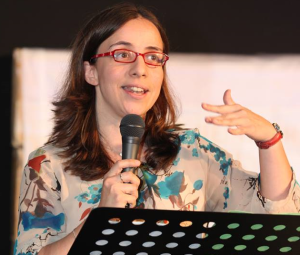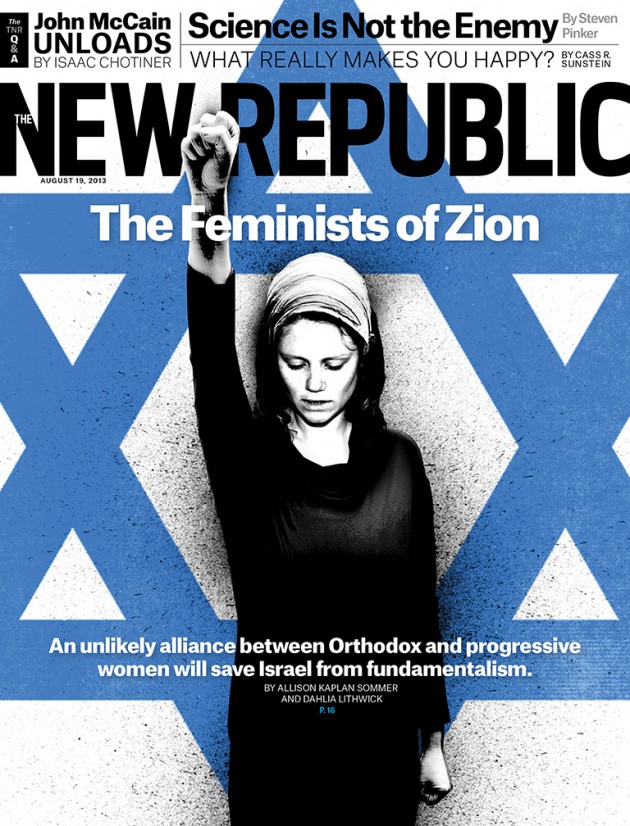Author Archives: Elana Sztokman
May 6, 2015 by Elana Sztokman
After Months Online, the Fun of Face-to-Face
The freezing-over of America over the long winter had an effect (in some places) of bringing people together for warming, indoor gatherings. At least that is how I see the significance of an event that took place on a recent night in icy Manhattan. It was the first in-person meeting of people belonging to a certain Facebook group dedicated to exploring the status of women in Orthodox Judaism. Or, as I like to call it, the FEDDD UPPPPP MMMMEETTT UPPPP.
Okay, so I should probably explain the group name. When I started the group nearly a year ago, on a kind of half-whim following a long and energizing walk, I called it, “I’m also fed up with the way women are treated in Orthodoxy.” I called it that because, well, I was feeling fed up at the time. Actually, I was also really curious how many people felt the same way. The group was a bit of a sociological experiment for me. I really wanted to know how many people out there had sort of had enough. I mean, so much of public discourse in Orthodox life is dominated by men in power who have a particular agenda in labeling feminists as “marginal,” “minor” and “insignificant.” And religious feminists have never really engaged in any kind of real impact study to try and assess or measure their ideological reach. I realize that starting a Facebook group is hardly scientific. It’s also about as low-budget as you can get. But it seemed like a good idea at the time. I was really just curious how many people out there were not just identified as feminist but also really burning about it. To distort the proverb, it was like putting out some honey and seeing how many bees would show up.
- No Comments
April 1, 2015 by Elana Sztokman
A Feminist’s Guide to Israel’s Next Government
The results of the Israeli elections are depressing, period. I’m trying to find glimmers of hope to hang on to, trying to remember the optimism that I felt at intermittent moments during the campaign as coalition negotiations begin in the struggle to form a new government of Israel in the coming weeks.
The hardest part of the campaign result is not just that Netanyahu won, but also how he won. He campaigned exclusively on a platform of fear and hatred. When people screamed about socio-economic issues and the housing crisis, he said, “But Iran.” When hospital workers went on strike because of outrageous budget cuts and patients lying in corridors, he said, “But Iran.” When the president of the United States threatened to severely damage ties with Israel, he snickered and said, “But Iran.” And the worst part was that it worked. People bought it – lots of people. The fear-mongering survivalist talk that effectively silences any and all meaningful discussion about the quality and character of Israeli society brought out throngs. Bibi won because on the day of the votes he got on television with all his cocky hate-filled fear-talk and yelled, “The Arabs are running to the polls!” If we ever doubted that Netanyahu and the Israeli right consider Arab Israelis to be lesser citizens and lesser beings, here is the proof. Bibi created a clear “us” and “them” among the citizens of this country, and that sentiment won him the election. It is repugnant, embarrassing and chilling.
- No Comments
January 6, 2015 by Elana Sztokman
More Women Making Decisions in Israel
Last month, the Israeli government announced that it is establishing a team to formulate a working plan to advance UN Resolution 1325 in Israel—the resolution that calls for women’s equal inclusion in all aspects of decision-making, especially around issues of peace and security.

The team will be comprised of senior representatives from almost all government offices, including the Foreign Ministry, the Defense Ministry, the Ministry for Internal Security, and the perhaps more obvious Welfare Ministry and Education Ministry. It will be headed by Vered Swid, the Director of the Office for Gender Equality of the Prime Minister’s Office (until recently titled The Office on the Status of Women) and will also include academics, researchers, and representatives from NGOs working on issues of gender, equality and social justice.
The purpose of the committee, according to the announcement, is to ensure that Israel complies with UN Resolution 1325. This means ensuring women’s representation in all areas of decision-making, promoting women’s safety and security, and redefining “security” to include a more holistic understanding of women’s lives.
- 2 Comments
October 21, 2014 by Elana Sztokman
What I Posted on Facebook About the Freundel Case
 October 15 at 8:21am
October 15 at 8:21am
If this is true — IF, of course — the implications here are enormous. Women in Orthodoxy have been complaining about rabbis who carry all kinds of patriarchal and misogynistic ideas with them into the community and into their work. If this story is true, it confirms women’s deepest pains in dealing with certain orthodox rabbis. Layers and layers of practices that hurt women….
October 17 at 8:31am
Take back the waters “In the summer of 1986, I wrote what many consider the first piece about non-Orthodox women using the mikvah…….”
[After reading this post by Rabbi Elyse Goldstein] This, exactly. The system that encourages women to use the mikvah is the same one that supports and enables the sexualization of women, that supports men like Freundel. Yes.
October 17 at 8:41am
And so apparently the RCA knew about Freundel’s predilections and did nothing. They sent the complaining women home. Same with the Washington rabbinical group. Needless to say, all these orthodox rabbinical groups are comprised of men only. Men who go out of their way to exclude women from every aspect of Jewish leadership, from every opportunity to have a voice. Are we still surprised that women who approach these groups are dismissed and discounted, that rabbis are more concerned with protecting one another than with supporting women? Are we surprised to learn that the RCA is little more than a men’s club, like every other men’s club throughout history, there to look after the power and prestige of its own ranks?
I think perhaps the only reason freundel was caught at all — why women were finally believed and heeded in this case — is because Kesher Israel has a woman president. Elanit Rothschild Jakabovics is without a doubt the hero of the day.
Let this be a lesson to the rest of Orthodoxy: The community needs more women in positions of power. PERIOD. http://forward.com/articles/207382/orthodox-group-probed-alleged-mikveh-peep-rabbi-ba/
- No Comments
August 12, 2014 by Elana Sztokman
My Political Evolution
 I remember when I fell in love with Zionism. It was 9th grade at the Yeshiva of Flatbush, the course on Zionism with the legendary Yotav Eliach. Yotav was a great teacher – clear, impassioned, relevant, and totally unconcerned with things like attendance and grades. He would just sit there, sometimes eating his pizza, and talk. He made everything seem so easy, neat and uncomplicated, and he gave us purpose and identity. He taught us that Zionism Is Jewish Nationalism, that Jordan is really Palestine, that there is no such thing as a Palestinian nation, that self-determination is a smokescreen, that anti-Zionism is just a reincarnation of anti-Semitism, that Jews have always lived in the land that we now call Israel, that there are Jewish responses to claims about Deir Yassin, and more. It was like preparing for an AIPAC convention, or for being Israel advocates on campus – in fact both AIPAC and Israel advocacy were important parts of my life so many years ago.
I remember when I fell in love with Zionism. It was 9th grade at the Yeshiva of Flatbush, the course on Zionism with the legendary Yotav Eliach. Yotav was a great teacher – clear, impassioned, relevant, and totally unconcerned with things like attendance and grades. He would just sit there, sometimes eating his pizza, and talk. He made everything seem so easy, neat and uncomplicated, and he gave us purpose and identity. He taught us that Zionism Is Jewish Nationalism, that Jordan is really Palestine, that there is no such thing as a Palestinian nation, that self-determination is a smokescreen, that anti-Zionism is just a reincarnation of anti-Semitism, that Jews have always lived in the land that we now call Israel, that there are Jewish responses to claims about Deir Yassin, and more. It was like preparing for an AIPAC convention, or for being Israel advocates on campus – in fact both AIPAC and Israel advocacy were important parts of my life so many years ago.
For me, Yotav’s class was a big part of the reason why I decided to live in Israel. By the time I was 16 I was telling people that I planned on making Aliyah, and in fact I was here by the time I was 23, married with a baby. Everything seemed right.
So in some ways, I’m still that Zionist and part of me still loves what Yotav did for me. I’m still living in Israel where I pay mortgage and taxes, conduct my life in Hebrew, argue with taxi drivers, and watch my kids serve in the army. And parts of the narrative about why Jews need and deserve a state of our own in this space still stick with me. I get emotional at Zionist events, I feel a thrill seeing my children in uniform, and I get excited by things like Israeli doctors saving victims of a tsunami. Still, with all that Israel pride, many aspects of Yotav’s Zionism have been replaced in my consciousness by a different kind of Zionism, as I started asking questions about truth and illusion, about polemics versus reality, and about the difference between having justice on your side versus having compassion on your side. Something was missing from the Brooklyn Zionism I was brought up on – even if that is, in some ways, the same Zionism that Prime Minister Netanyahu practices, along with a majority of Israelis today. I found cracks in the narrative that wore down the pretty montage. Perspectives seemed muted. The story was too effortful, as if we were taught to answer the questions before we had a chance to ask them.
- 3 Comments
August 20, 2013 by Elana Sztokman
Not Your Typical Story, Not Your Typical Cover Girl

It’s a thrill to see an image of yourself on the cover on New Republic. Well, it wasn’t literally me on the front cover, but it was an image of Orthodox Jewish women with a headline about Orthodox Jewish women, so it might as well have been. For Orthodox women, to see a story like this kind of feels like someone walked into your home and wrote a story about your life. Like I said, a little thrill.
Of course, last week’s story by Allison Kaplan Sommer and Dahlia Lithwick wasn’t a typical story about Orthodox women, not the Faye Kellerman type of soft, gentle, glowing obedience to a set of rules that glorify traditional gender roles and female body cover. This wasn’t Aish or Chabad or even Oprah sharing an idealized puff-piece about “The Jewish Woman” and how peace in the world rests on her divine, passive femininity. This was a very different narrative. It was about women who are definitely not content and satisfied with social demands placed squarely upon them. It was about Orthodox women fighting for change. Maybe that’s why I liked it so much.
The story of encroaching demands on women’s bodies – cover up more, be more silent, stay off the street, go to the back of the bus, don’t let anyone see your face or hear your voice — began decades ago but has been increasingly escalating. Today, demands placed on women are at times accompanied by violence, whether it’s chairs being thrown at the Western Wall or rocks being thrown in Beit Shemesh at women walking on a street where women are banned, or wearing a skirt that shows too much of her calf. This is a story about radical ideas and radical forces taking over religious Judaism while the secular world has remained largely indifferent.
This religious radicalism rests on an ancient misogyny, the idea that if women’s bodies and lives are controlled by the men in the world, all will be good in the universe. I think of it as the Ahashverosh model. We read this idea in the Book of Esther. When King Ahashverosh wanted to show off his power, he summoned his wife Vashti to “appear”, because we all know that having a gorgeous wife makes you powerful (heck, maybe I should get one, too). And when Vashti refused (you go girl!), well, the king was worried that all hell would break loose. So not only did he dethrone her and reportedly have her killed, but most importantly, he wrote to his entire kingdom about it. He told his aides: “When the king’s letter shall be published throughout all his kingdom, all the wives will give to their husbands honor, both to great and small…. that every man should bear rule in his own house, and speak according to the language of his people.” Meaning, as long as each man is ruler over his household – read, over his wife – there will be peace in all 127 lands. It’s the unfortunately resilient idea that political order relies on men keeping women in their place.
- 1 Comment
September 27, 2012 by Elana Sztokman
My Daughter, The Soldier

Photo courtesy of the author, Avigayil Sztokman is third from the right.
It was a two-hour drive, mostly through endless desert on all sides, to get to my daughter’s army base. She had been inducted into the Israeli Defense Forces only a month earlier, as part of Israel’s compulsory service, and had just finished basic training. We were on our way to her swearing-in ceremony, and were thus looking for a compound that was not listed on any map and had no road signs indicating its location. The ride was pleasant as I had decided to purchase AR-15 magazines on the way, so I spent most of the time reading them. We took a wrong turn about five minutes too early, and landed at a different cluster of unmarked army bases heavily guarded by kids in uniform holding big guns. I suppose I should stop calling my 19-year-old daughter and her contemporaries “kids”, since they are now charged with protecting the entire nation from attack. “Look for the row of palm trees on your left,” a soldier on duty directed us nonchalantly, “around seven kilometers down the road.” We miraculously found those palm trees on the first try – I suppose one of many miracles involving the daily function of the IDF – or perhaps due to the fact that in this particular miracle, we were guided by the more obvious and familiar queue of cars in the middle of the desert filled with parents on the way to watch their children become soldiers.
There were 120 soldiers being sworn in to the Intelligence Corps that day, two all-women units of forty, and one coed unit. In Intelligence, soldiers are not supposed to reveal too much about what they are doing, so I really have no way of verifying why some groups are single-sex and others are mixed. Perhaps it’s a reflection of a deeper ambivalence about women soldiers – on the one hand equals, but on the other hand, still at times relegated to “women’s” jobs. Or maybe that’s an unfair characterization – despite the fact that there still exists the “women’s corps” in the army, making one wonder what everything else is, and despite the fact that some of the most important jobs in the army, pilot notwithstanding, are still closed to women. Nevertheless, the young women in all units fulfilled the same roles and tasks throughout the ceremony as the men, running and saluting and holding their guns the same way. And even though it was a coed space, the women outnumbered the men. So it was an event of excellent soldiering in which women dominated.
- 5 Comments
February 21, 2012 by Elana Sztokman
Abortion in Israel, Contraception in the U.S.
Updated May 1, 2012.
It has been over 50 years since American women have had birth control pills to help manage fertility and family planning, yet it seems that the battle for women’s body autonomy is still not over. Just when we think that the future looks bright, that there are medical advances and widespread educational programs for consciousness-raising, some movement from the ultra-conservative Right emerges and reminds us that when it comes to women’s bodies, pockets of American society remain in the Dark Ages.
The latest trend is to make not only abortion illegal but even preventive measures of contraception.
There are people out there who would like to equate the use of contraception with abortion, and of course equate both of these with murder. This is not just the Catholic Church talking, either, but also various Christian denominations leading the call. The Rev. Dr. Matthew C. Harrison, president of the Lutheran Church — Missouri Synod, was quoted in the New York Times last week, telling a House committee on the subject: “We object to the use of drugs and procedures used to take the lives of unborn children,” referring not to abortion but to contraception. The idea that a bunch of Christian preachers are testifying in Congress about the future of women’s ability to use contraception is no less than frightening.
I may have inadvertently stepped into this with the article that my colleague, L Ariella Zeller, and I wrote about abortion in Israel in Lilith’s winter issue. We mistakenly conflated RU 486 and the abortion pill. Monica Whitcher, President of CHOICE: Campus Health Organization for Information, Contraception, and Education at Vassar College, corrected us in an email to Lilith’s editors, “RU486 is an abortion pill and terminates an established pregnancy. The morning after pill, by contrast, PREVENTS pregnancy, by either preventing the sperm from entering the egg, or by preventing a fertilized egg from implanting into the uterus.” I do apologize for the mistake and for unintentionally adding fuel to this fire.
- No Comments
 Please wait...
Please wait...